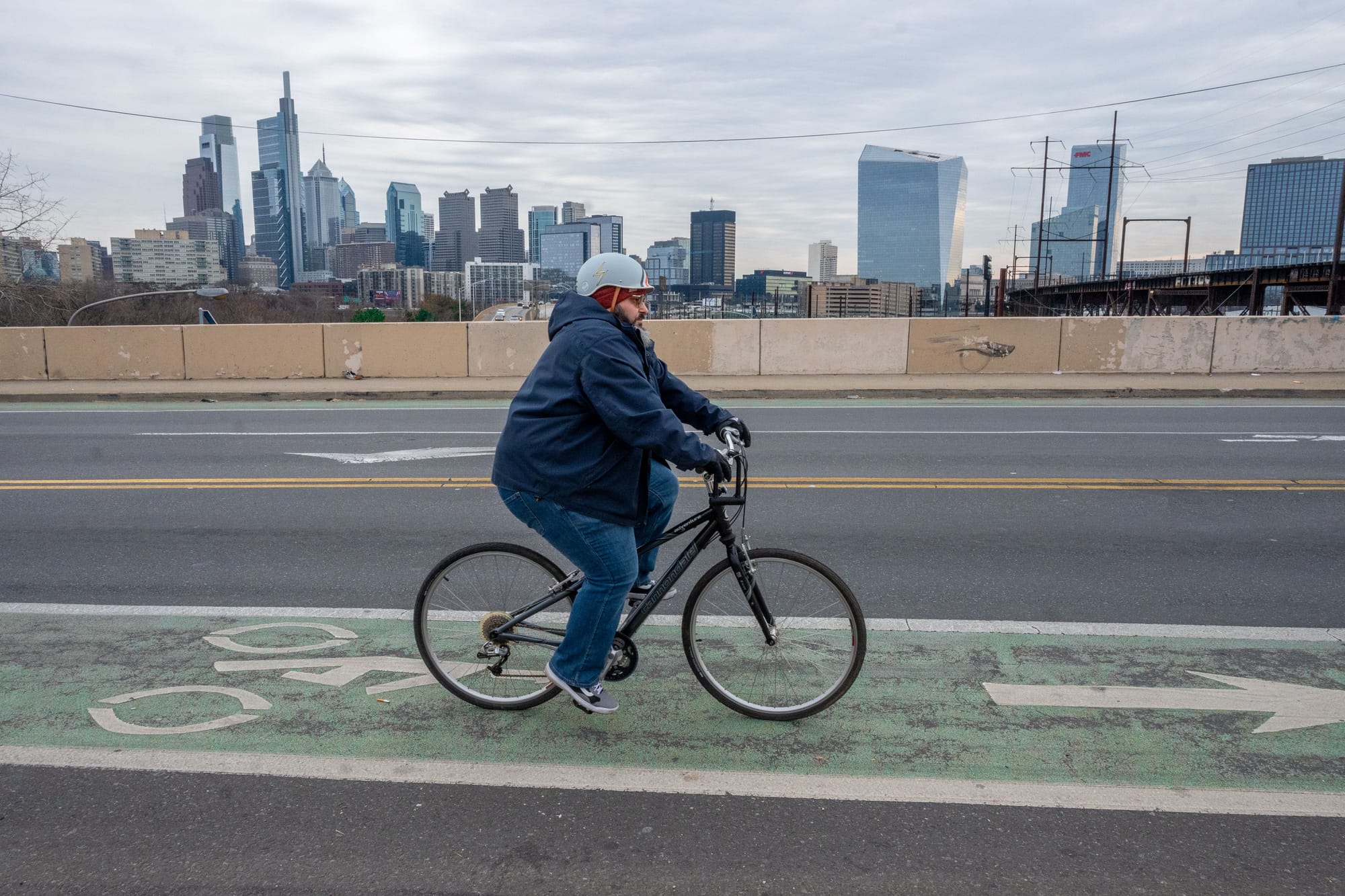Directing the Bicycle Coalition with Sarah Clark Stuart and Chris Gale
After eight years leading the Bicycle Coalition of Greater Philadelphia, Sarah Clark Stuart recently handed the reigns to Chris Gale to serve as the organization's new Executive Director. Get to know them, how they bike, and their views on advocacy in today's story.

Special thanks to Sarah Clark Stuart and Chris Gale, who graciously spent their time talking and riding with me to develop this story. Sarah is a highly regarded leader and advocate who was recently awarded 5th Square's Urbanist Lifetime Achievement Award. Chris is new to the cycling community but a skilled coalition builder with the tools to advance cycling interests in Philadelphia. Please support their work by joining or renewing your membership with the Bicycle Coalition of Greater Philadelphia today!
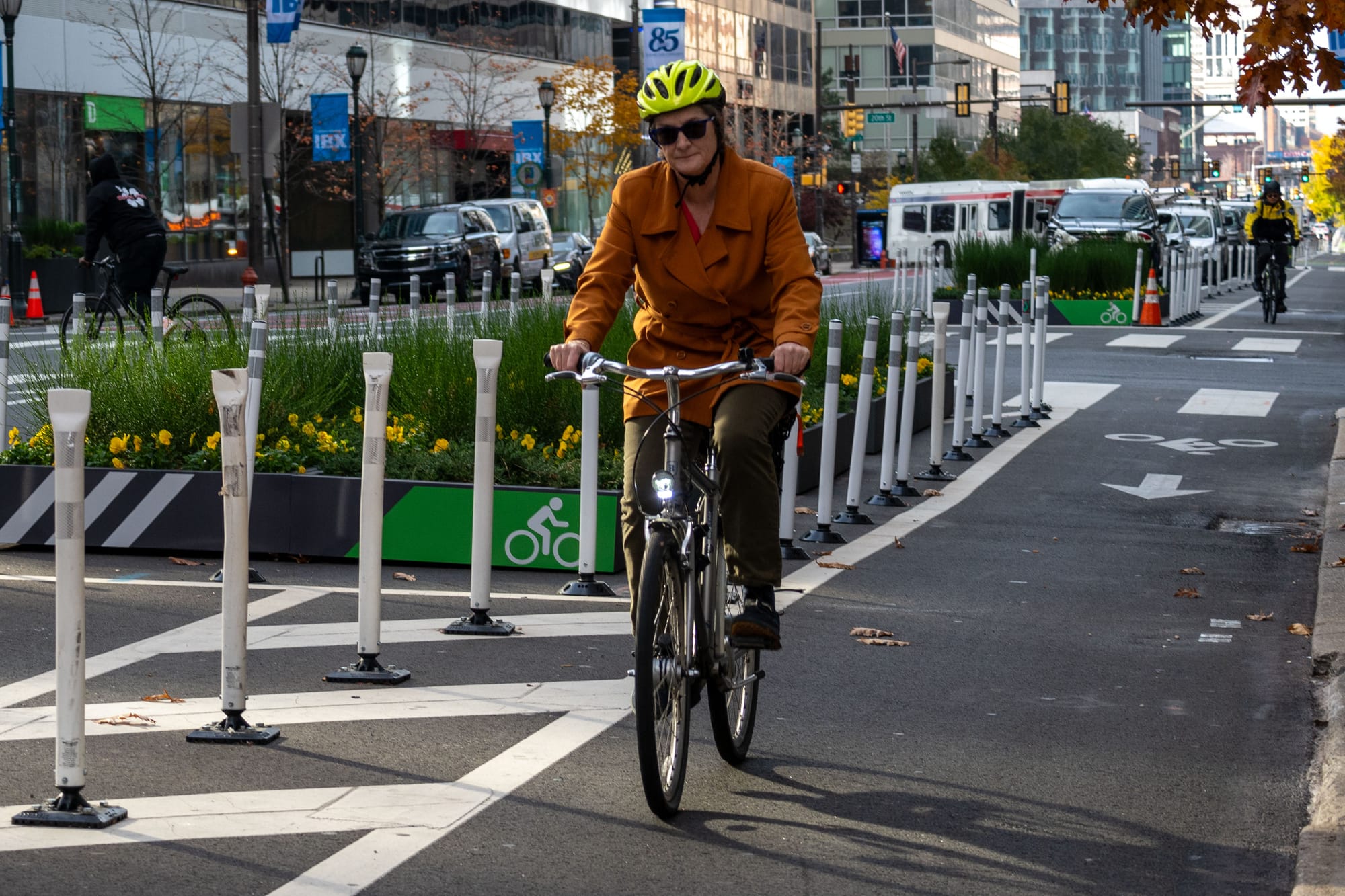
Sarah Clark Stuart commuting down Market Street to her office at 1500 Walnut Street.
Developing a Coalition
Philadelphia's cathedral to urban transportation, 30th Street Station, is a fitting birthplace for the Bicycle Coalition of Greater Philadelphia. There, in 1972, in the transit hub's old restaurant and bar, the founders rallied around the Earth Day movement and a growing appetite for reduced automobile emissions, pollution, and congestion. For years those activists united like-minded advocates to fight for cyclists' rights and to make streets and trails safer for everyday transportation cyclists - not just those using bikes for recreation - and has achieved countless victories in the decades since.
The Bicycle Coalition evolved from a purely volunteer organization to a membership and fundraising based organization with a full time staff and Executive Director. Sarah Clark Stuart has been the Executive Director for the last eight years but recently decided "it felt like the right time to hand the reigns over" to a new leader. Let us all welcome Chris Gale to the helm of this highly influential team.
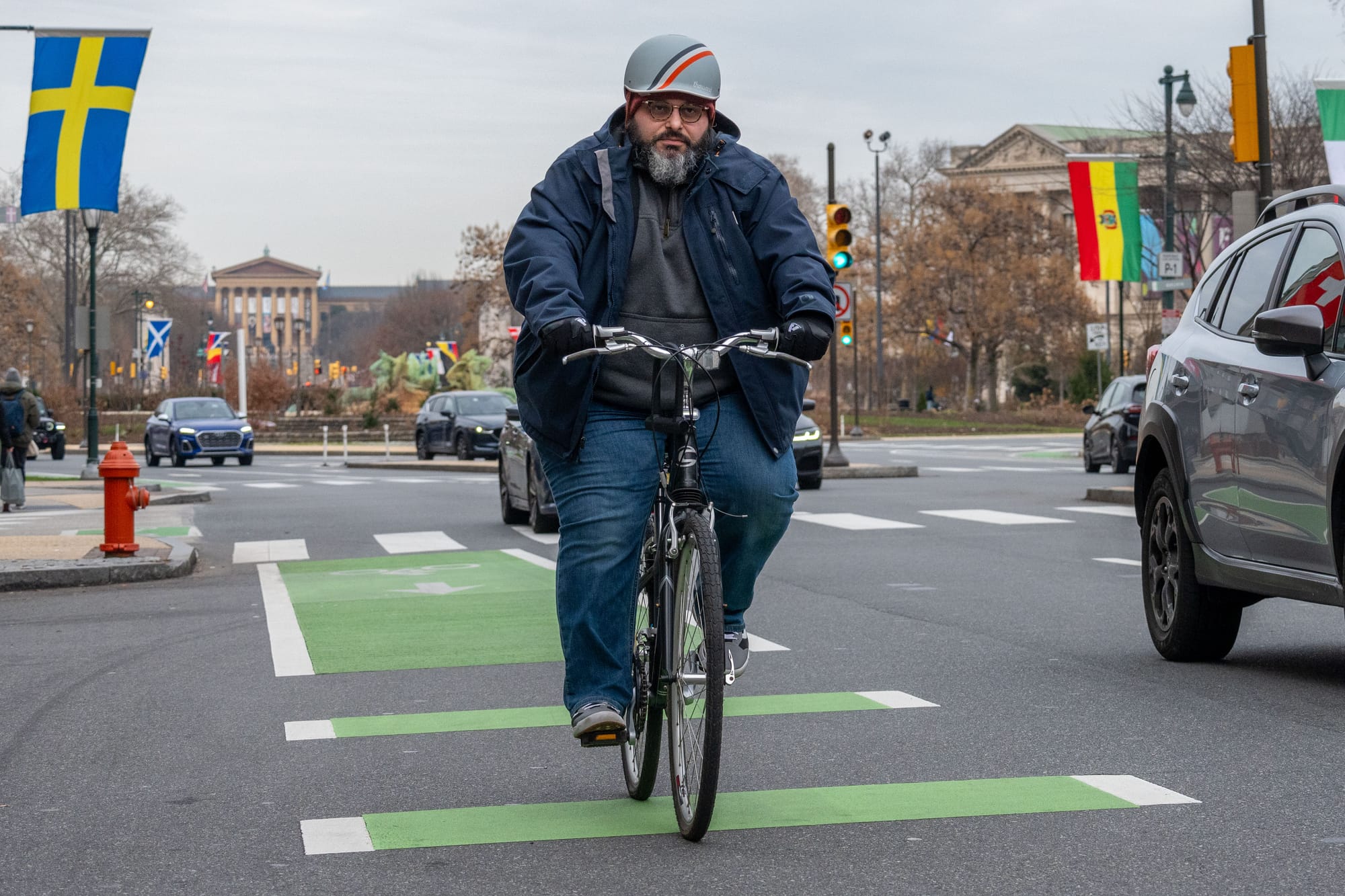
Chris Gale riding towards City Hall on the Benjamin Franklin Parkway.
Leading the Coalition into the future
Before the new director had been named, I sat with Sarah and asked what qualities her successor would need in order to achieve the organization's goals. She told me they'd need to juggle a variety of issues and tasks and be the face of the organization to stakeholders and the public. They'd need strong social capital, good trust, and relationships with decision makers and donors. They'd need to be committed to working towards a ridership that reflects the demographics of the region and empowering people to have a safe ride wherever they want to go.
Chris Gale moved to the region from Michigan (and, don't worry, has since become a committed Eagles fan) to attend the Master of Public Administration program at Villanova. His work over the last ten years has focused on youth and community development and in that time he's developed strong networks while connecting people with resources in underserved communities like Hunting Park-East Tioga. This experience makes him uniquely positioned to grow the Bicycle Coalition's influence where more people can benefit in more ways beyond the central city.
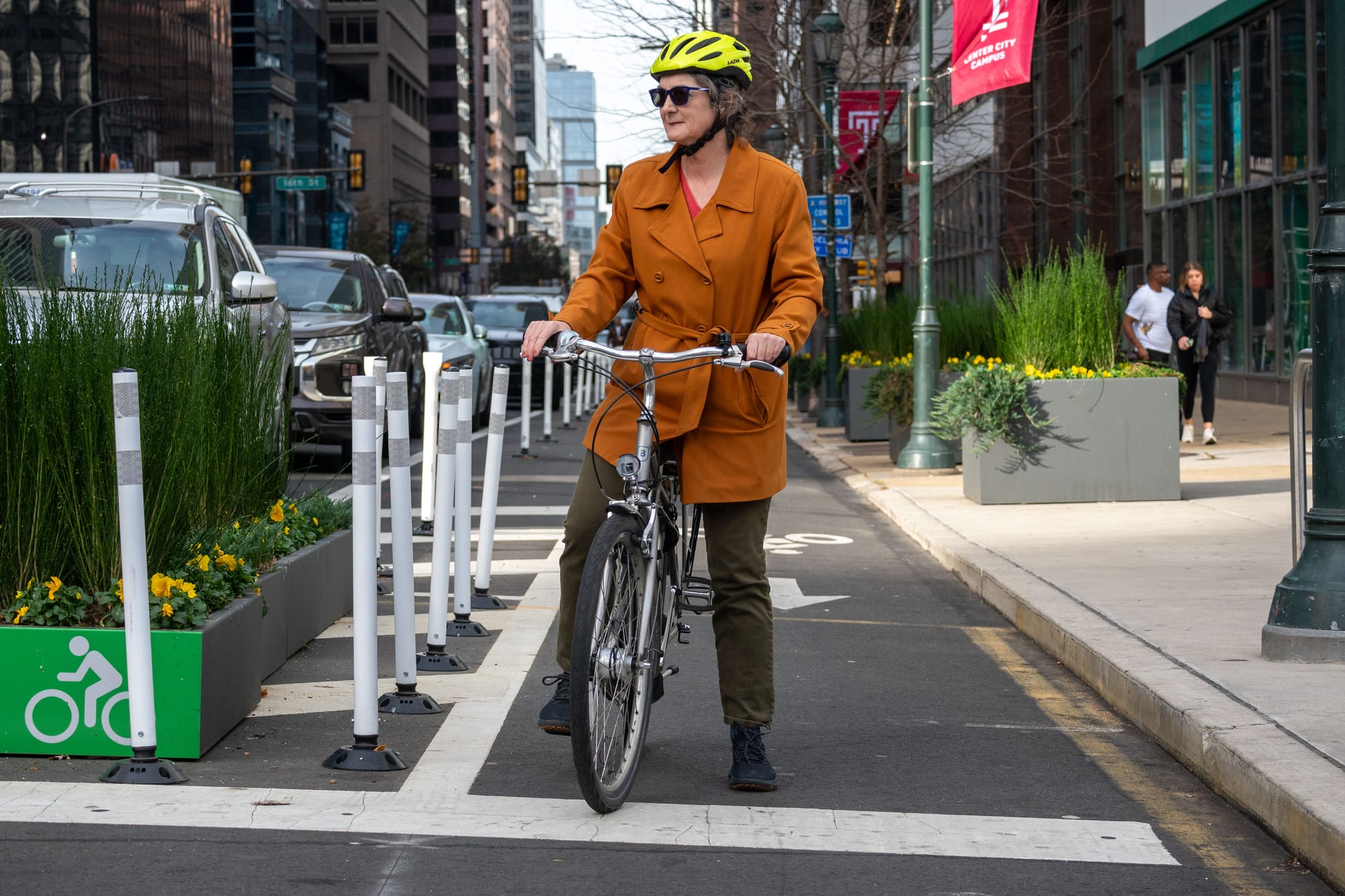
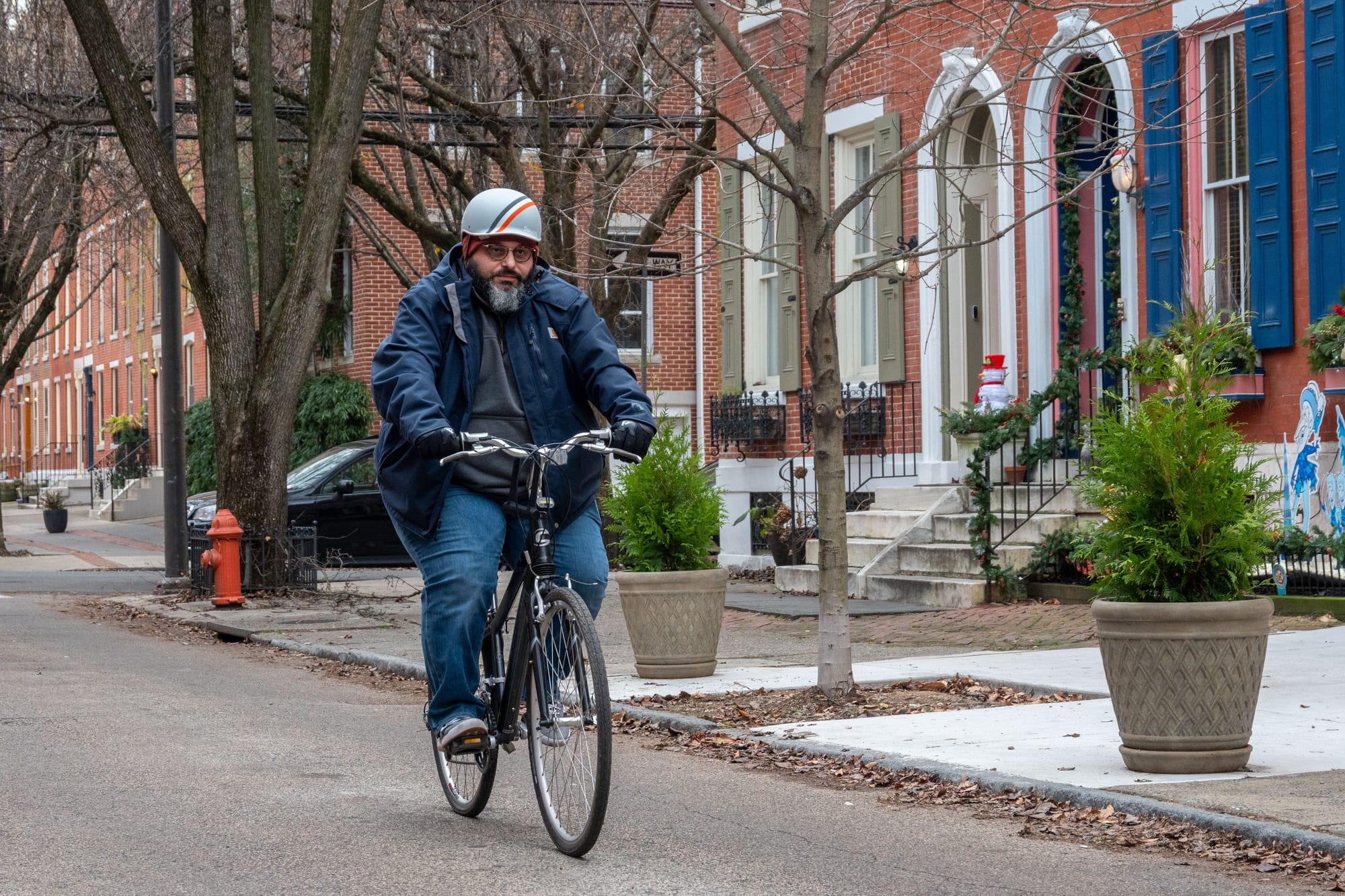
Sarah Clark Stuart at 15th and Market. Chris Gale on Mt Vernon Street in Spring Garden.
Challenges and opportunities
Sarah told me that one of the biggest issues facing advocates is the city's lack of resources. Philadelphia's high poverty rate complicates financing new projects and maintaining existing infrastructure. Another major issue is the stereotype of cyclists being a monolith of older, wealthier, white males. In reality, people who ride bicycles are much more diverse and use bikes for far more than recreation alone. She says that this misperception dissuades elected officials from prioritizing scarce resources to bicycle issues. Sarah praised Indego for expanding access to more people of color and low-income communities. As bike-share coverage expands north towards Broad and Erie, she says the network of protected bike lanes must also expand to encourage new riders to embrace the system.
Chris plans to overcome these obstacles by getting his team out into the city's diverse neighborhoods, getting to know people in their communities, and illustrating the value of high quality bicycle infrastructure. Showing up early and maintaining careful dialogue over time, disenfranchised communities may recognize that safer streets are a major benefit for their families, neighbors, children and the elderly.
Chris wants to talk to anyone he can. He wants to be accessible to anyone who's willing to spend their hard-earned money on a membership and laughed that his email is impossible to forget - it's chris@bicyclecoalition.org! As for perception, Chris joked that if anyone still believes that the Bicycle Coalition isn't committed to diversity, they need look no further than the fact that they hired a self-described overweight Chicano to be their Executive Director. If he belongs in this community, so can anyone.
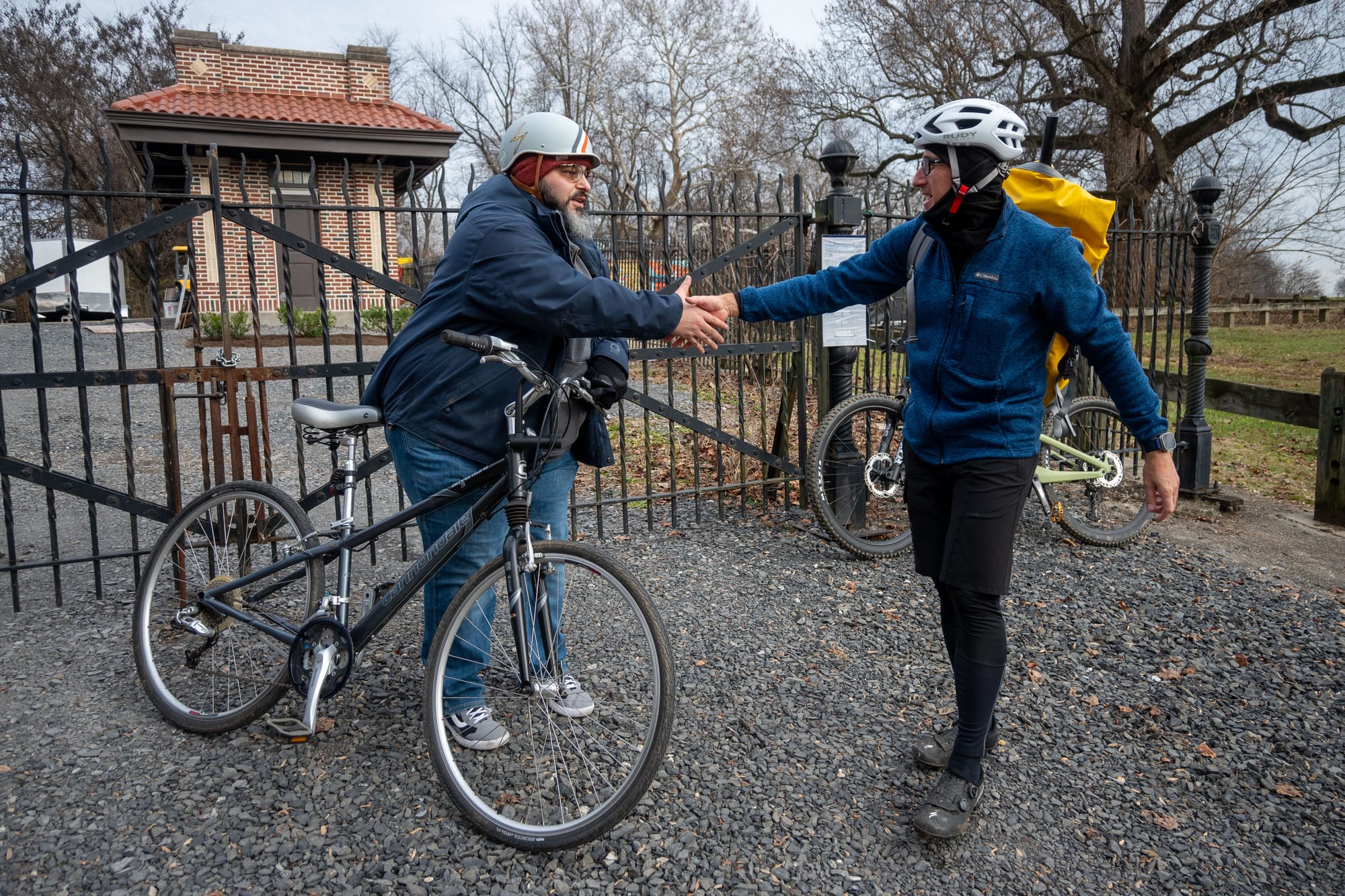
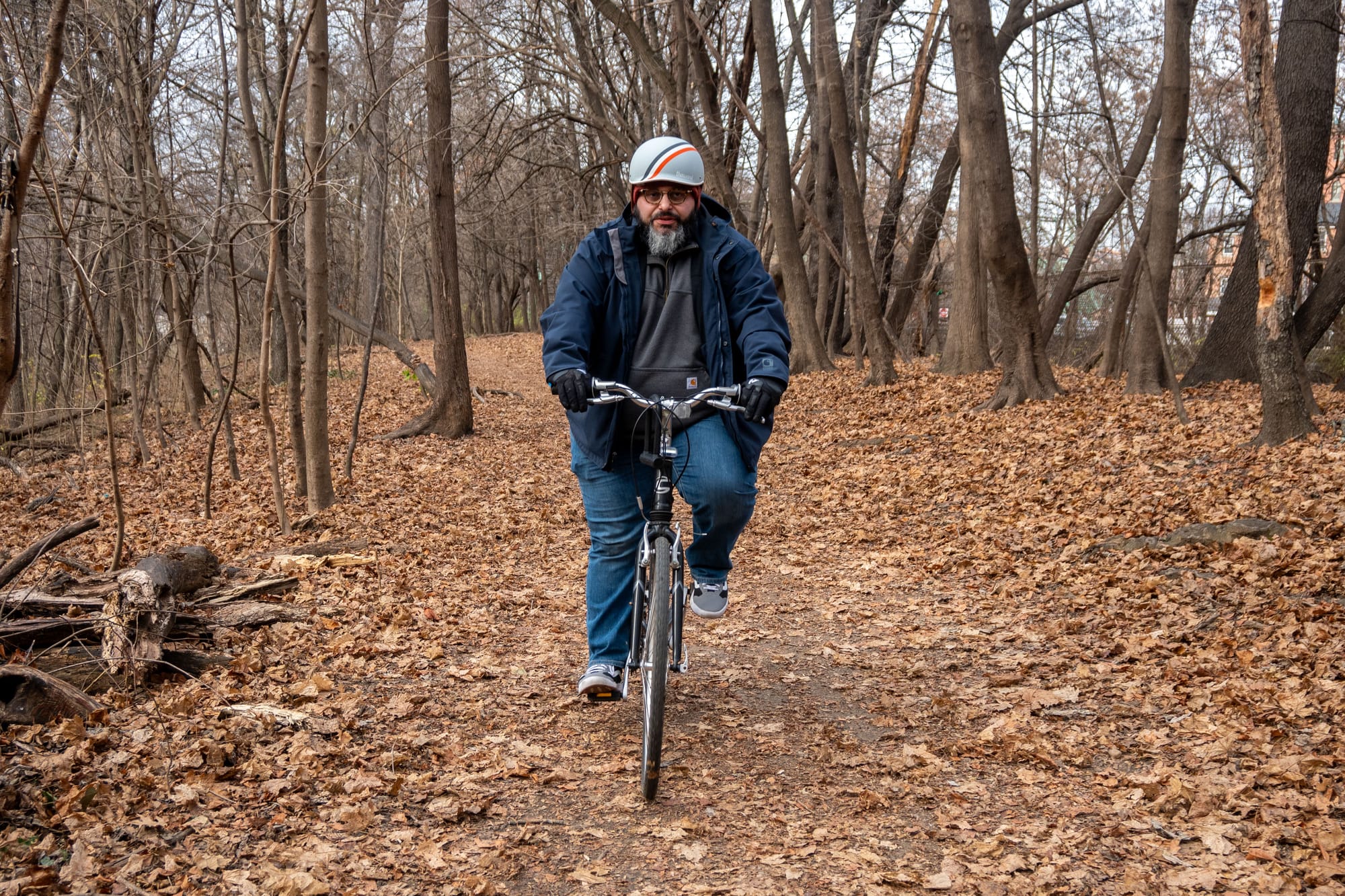
Chris Gale greeting a cyclist who was donating supplies to the Bicycle Coalition's youth development program. Chris Gale exploring the unpaved Sedgley Trail near Lemon Hill.
Biking in Philly
Sarah loves the primal feeling of freedom and joy she gets from riding a bike, which she says is so hard to reproduce in other ways. I asked Sarah what makes Philadelphia such a special place to ride a bike. To her, it's the density: "South and West Philly have some of the highest rates of commuting in the country - not because they have great infrastructure but because they're so dense and you can ride two or three miles to work or school on narrow streets where cars can't go too fast, unlike on arterials like in NYC or Florida." Her favorite place to ride is on car-free streets and she fondly remembers riding when the streets were closed to cars during the Pope's visit to town in 2015.
Though Chris admits he hasn't been riding a lot in recent years, he was attached to his bike as a kid and mused over the adventures his bike enabled in his youth. Since starting at the Bicycle Coalition, he's been pedaling to the Center City office from his Fairmount home. He told me he's loved the perspective the bike has offered compared to the car and he's enjoyed rediscovering the city from this new vantage. When we met at Clemente Rec Center to ride together, he hopped up over the curb smiling like he'd never spent a day off the bike and he is looking forward to riding with his family along the river to Manayunk sometime soon.
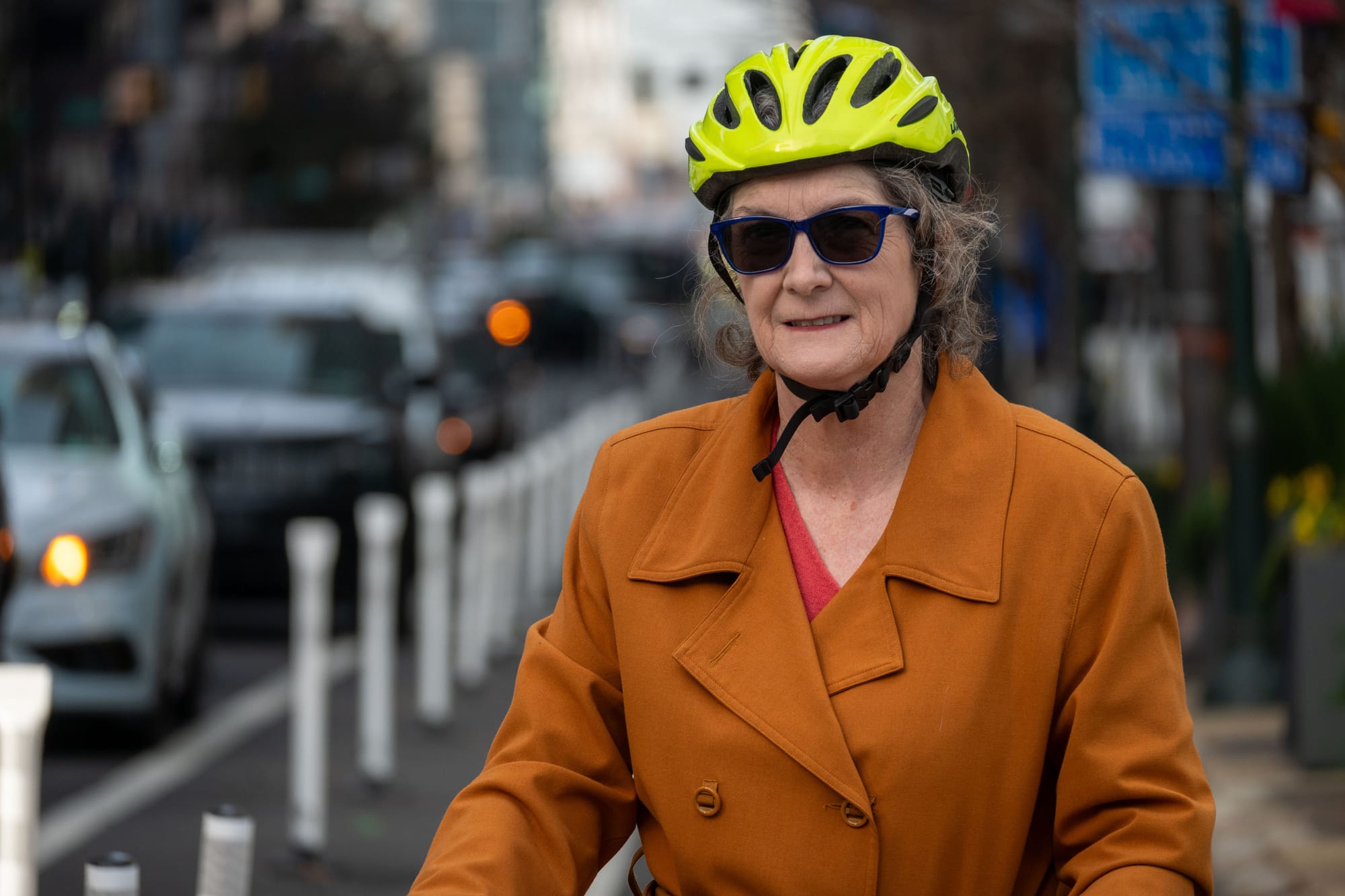
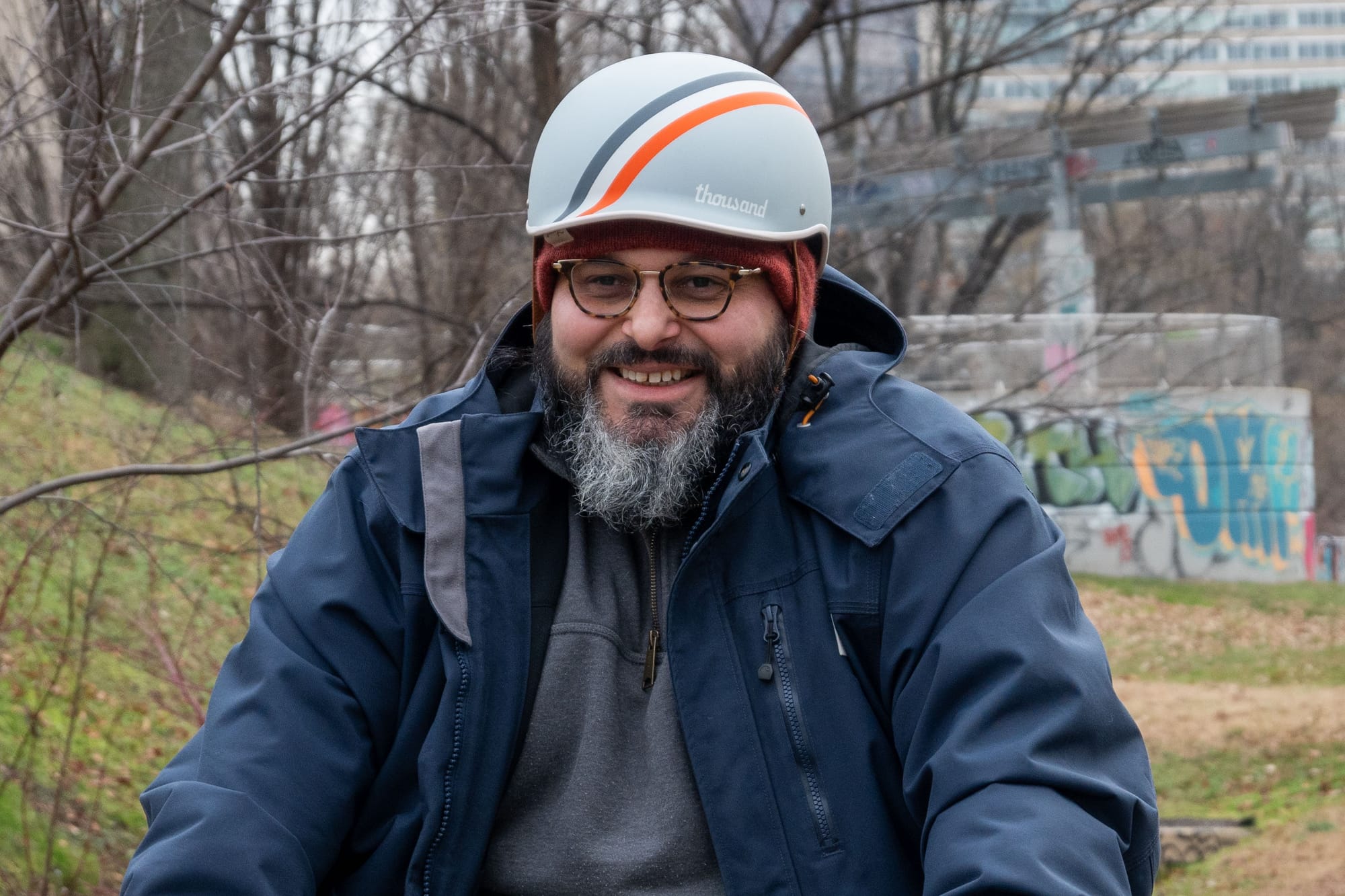
Looking Forward
Sarah imagines a future with three times the amount of bike commuters in Philadelphia: "it would be gigantic. It would totally change the landscape of the street. It would totally change the feel of the street." She says so many more cyclists on the streets would naturally slow traffic and improve safety. But she says we've plateaued in commuter numbers because the existing network of trails and protected bike lanes are not well connected. We can't only pay attention to the needs of existing cyclists but need to create infrastructure that will attract new cyclists or encourage recreational cyclists to embrace commuting. Simply put, the community needs to be more welcoming and open to beginners.
I asked Chris what his legacy will look like ten years from now. Without hesitation, he responded that the Bicycle Coalition's membership will better comprise the city's rich diversity. He also wants to be remembered for helping to develop a network of streets that are safe for everyone. In some ways, we don't yet know what those streets will look like, and that's ok. We all have the power to shape the future, and Chris stressed that readers of this story should join the Coalition or renew their membership and join the conversation.
